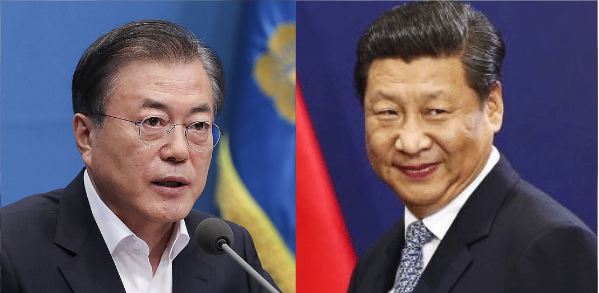One of the many adverse effects of the Biden Presidency has been South Korea’s renewed proximity towards the People’s Republic of China. To be very blunt about it, South Korean President Moon Jae-in is sitting firmly in Xi Jinping’s lap with a slew of pro-Beijing decisions and optics over the past few months. Yet, Moon probably doesn’t understand that his highly unpopular policy of warming up to China can cost his centre-left Democratic Party heavily in the 2022 elections.
Actually, South Koreans actually hate China more than any other global power on this planet, including Japan. People in South Korea are afraid of China’s “cultural imperialism” wherein Beijing tends to appropriate Korean cuisines, national heroes, and even Korean clothing. In such circumstances, Moon Jae-in’s China ‘pivot’ is not at all resonating with the popular opinion of China in South Korea. On the other hand, the Conservatives are happily cashing in on Moon Jae-in’s blunder.
The fact that South Koreans hate China is no longer a secret. The Chicago Council on Global Affairs released a survey last week which showed that around six out of 10 South Koreans viewed China, South Korea’s largest trading partner, as more of a rival. In the same poll, South Koreans’ favourable opinion of China stood at an average rating of 3.1 out of 10, which was noticeably lower than 3.2 for Japan.
Japan is the former colonial ruler of South Korea and there is a sense of historical animosity in South Korea-Japan relations. Yet, the paper dragon is being seen as a bigger threat by South Koreans.
In fact, data released by the Pew Research Centre in October 2020 showed that anti-China sentiment is on the rise in South Korea, especially amongst youngsters. Overall, 82 per cent of South Koreans aged 30-49 years viewed China negatively, while the number stood at 80 per cent for those aged 18-29 years. Even among South Koreans aged above 50 years, 68 per cent held a negative view of the Communist nation.
South Koreans have every reason to hate China. The paper dragon’s “cultural imperialism” is too manifest to ignore. South Koreans even vented online about Chinese search engine Baidu’s act of listing a number of Korean foods such as kimchi and samgyetang, as cuisines of Chinese origin. Also, China has been trying to steal traditional Korean clothing hanbok by misrepresenting it as a type of Chinese hanfu.
Chinese academicians are actually making a conscious effort to stitch the perception of a multi-ethnic Chinese civilisation that included the ethnic Korean people. This troublesome ideology borders on neo-colonialism and provokes anti-China sentiment within South Korea.
Moon Jae-in’s reaction to China’s “cultural imperialism” has however been passive. The South Korean President is facing accusations of kowtowing to Beijing and now he is also being blamed for failing to take a tough stance against China’s poor response to the COVID-19 pandemic.
The anti-China sentiment within South Korea is also damaging Seoul’s attempts to foster closer ties with Beijing. Take, for instance, tourist-focused “Chinatown” in South Korea’s eastern Gangwon province. Some 500,000 South Koreans have petitioned their government to cancel the tourist attraction, which plans to showcase Chinese culture.
In electoral terms, Moon’s pro-China ‘pivot’ is already harming the centre-left Democratic Party. Recently, the Democratic Party had to face a drubbing in the mayoral by-elections in South Korea’s two biggest cities- Seoul and Busan. South Korean youngsters clearly deserted the Democratic Party and Moon Jae-in, a year before the scheduled Presidential polls.
Moreover, South Korea’s main opposition People Power Party’s (PPP) understands how it can capitalise upon Moon’s unpopular China policy. PPP’s policy white paper indicates its hawkish stand regarding the paper dragon. The Conservatives in South Korea have also been warning against China’s object to subvert South Korean democracy by facilitating the election of progressive politicians. In fact, accusations of “stolen elections” in South Korea last year centred around such allegations about China’s supposed interference in South Korean politics.
Conservatives are thus using the ‘China threat’ to make deep electoral inroads and they are doing it quite successfully. PPP can actually win the 2022 polls on a single issue- Moon’s China policy. All they have to do is play up the anti-China sentiment amongst South Koreans who are already enraged about Chinese cultural imperialism. South Korea’s President is still sitting in Jinping’s lap and this might mark the downfall of the Democratic Party in South Korea.
